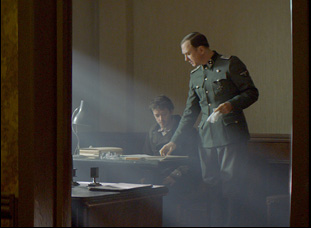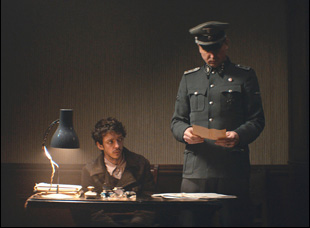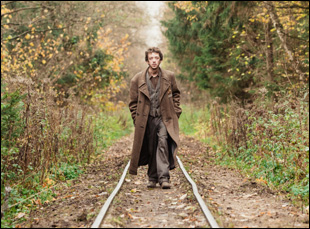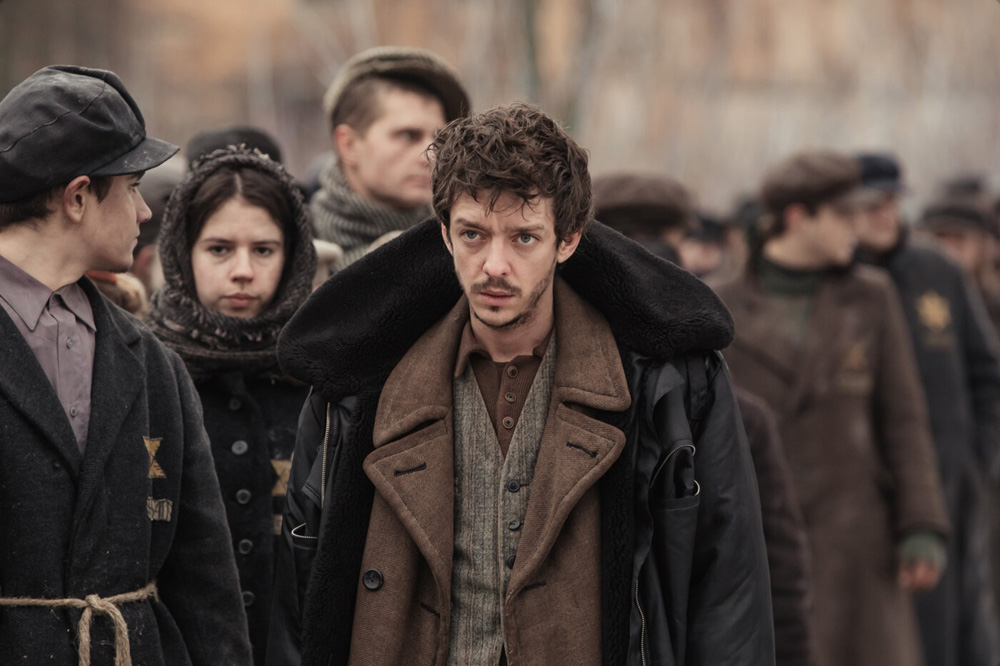It isn’t an easy decision for Gilles (Nahuel Pérez Biscayart) to part ways with a sandwich at the start of “Persian Lessons” in exchange for a book he’s offered in the back of a truck en route to Switzerland when he can’t be sure of when he’ll eat again as he attempts to elude Nazis in the midst of World War II, but something tells him there will be some nourishment to be found in the book. It isn’t obvious how when only knowing French and German, he can’t read the Arabic that the book is written in, but nonetheless, it proves to pay immediate dividends when the truck is intercepted by Nazi soldiers and carrying the book offers him a reasonable cover to suggest he’s not a Jew when admitting as much would surely get him killed, though the suggestion that he should be fluent in Farsi wins favor with a commanding officer (Lars Eidinger) who imagines himself opening up a restaurant in Tehran after the war ends.
There are many different ideas about language in “Persian Lessons,” including the tact that director Vadim Perelman takes to tell a story about the Holocaust where audiences are largely relieved of what they already know of the tragedy to open themselves up to a gripping story of survival as Eidinger’s Commandant Klaus Koch asks Gilles to teach him enough Farsi to get a restaurant off the ground, though Gilles probably knows even less of it than he does. Still, when his life depends on it, Gilles comes up with a crafty solution, inventing a dialect of his own, taking inspiration from the names of those he sees being murdered all around him as some sly way of having them acknowledged at all as an entire culture is being erased. The film is only Perelman’s third since rattling audiences with “House of Sand and Fog” in 2003, seemingly saving up his strength for each time out when the results can be so devastating, watching people of reason and seemingly sound judgment succumb to hatred and fear.
As Gilles has to commit to memory a completely fabricated language for only him and Klaus to be fluent in, “Persian Lessons” evolves into something unforgettable as the power dynamics between them are constantly in flux and the seemingly disenfranchised Gilles starts to have sway over the commandant and after the film itself has taken hold of audiences from its berth at the Berlin Film Festival on, it is beginning its theatrical run this week in the U.S. and Perelman shared how he found something new to say about this dark period in time, his own concerns about what might be lost in translation and making the best out of less than ideal filming conditions.
ars 
It was given to me among a stack of scripts by a producer and as soon as I read it, I [thought], “First of all, I always wanted to do a Holocaust film. Second of all, this is perfect because it’s profound. It’s not just how horrible it was, and ‘the poor, poor Jews.’” It’s not that kind of film. It’s about all of us in a way, so right away I would respond to that story and I do so few films, that for me I have to be moved emotionally by the story, and I was moved by this one.
Is it true that the connection between the names of those interned at the camps and the language that Gilles starts to invent, using their names as a base for his version of Farsi, was a creation of the film? That’s one of the moving elements, so I was surprised to learn it might not have been part of the short story.
It was [the screenwriter] Ilja Zofin, his great invention that added the profoundness to the ending because otherwise it would have been just the story of one survivor, and this way, there was a memorial to 3,240 people that would have perished. And I was the one that worked it out with the linguist [later on], working like every day on the language. I have a dictionary. And it had to be correct. I wanted it to be grammatically correct and impeachable.
From what I understand the script was originally in Russian, and of course, you have an Argentinian actor in Nahuel for a film set in Germany. And then you’ve got this invented language on top of it. What was it like to get all of it on the same page?
The whole thing was like a Babel’s Tower of filmmaking. I translated the original script to English quite liberally, and then we had to translate it to German and to Italian and to French and to Farsi — the [fake] Farsi and the real Farsi. So it was a great challenge. There was no problem communicating with anybody [on set] because I know Russian and English – and all the actors spoke English, but I had real trouble getting what was happening on the screen on the set because I don’t know German. I got a hang of it after a while, but at first I was lost as far as what was happening, and being a control freak, it was very hard for me to not know where they’re making the emphasis in the sentence and so on.

No, I actually think I neglected a lot of things because I was trying so hard to [discern] “What is he saying now?” That forced me to kind of get with it and understand exactly what you’re saying. Another challenge was that Nahuel didn’t speak German either, and 90% of the films is German, so he had to speak German phonetically for that.
He pulled it off – as his character does in the film. What was it like getting him and Lars together and seeing how they’d play off one another?
[The first time we met was for] 20 minutes in Berlin one time and it was just me and the two of them, and I don’t do rehearsals, so I don’t even know what it was supposed to be. I just want to sing together, so they started acting, and I go, “No, no, don’t bother acting. Just do.”Was it difficult to get the right tone when it does take a different approach to the Holocaust?
There’s a gamut that goes from the really visceral films where the viewer’s being shown the way it was, like “Son of Saul,” “Night and Fog,” and “Schindler’s List” to this other end of the spectrum, which is like “Jojo Rabbit” or “Life is Beautiful,” which try and do it with comedy, and I like being in the middle, so you’re laughing and feeling and seeing it try to be this one all in one. It was necessary to show the humanity to show, as Hannah Arendt wrote, “the banality of evil” and I’ve always thought about this guy [like Klaus Koch] in Auschwitz, who I’m sure existed, because they had their little houses for the officers outside the camp where they’d unwind and brought their families from Berlin. They brought their dogs and kids, and they set up house and they would go off to work every morning, and he’d stand there in that Hugo von Bosch uniform, and the wife would take the dust off his shoulders and go, “Have a great day at work, honey. Don’t be late [for dinner].” And he would say, “Well, I don’t know, we have a train coming in from Hungary today, not sure how long I’m going to be.” So the love affairs [in the film] and the office politics and the little backstabbing [amongst the Nazi bureaucracy] was human and necessary.

It was horrific. It was a really oppressive atmosphere, and we shot in the winter in Belarus, but it felt 10 degrees colder inside. You could see everyone’s breath and because of the history, [not only] was it Gestapo headquarters at one point, but also a KGB jail or some kind of army prison, it had a whole litany of stuff that you could feel it all inside. So it was really hard and that’s what we shot the barracks in and we built the office and kitchen all that in the quad.
Was there anything that happens that may change your ideas of what this could be?
There’s always surprises. The scene with clearing the snow where the Italian brothers get beaten, that wasn’t anywhere near the script. We woke up one morning in heavy snow, and there was no way to justify that because in scenes after, I have no snow on the quad, so I’m going, “What should I do?” And my assistant at the time, who actually is now my wife, said, “Why don’t they remove the snow during the scene? So immediately we had to go get shovels and a whole bunch of extras, and that’s what I did all day. We made up that whole scene, and it was a good introduction to the two Italian characters. It was brilliant [of my wife] to say that, and after they cleared the snow, there was no snow.
As hard to shoot as it must have been some other good has come out of it already. What’s it been like getting this out into the world?
It’s been amazing. The response has been incredible, starting with the 15-minute standing ovation in Berlin from the Germans and [now] I have a shelf of statuettes from festivals [around the world], though I don’t do it for the statuettes or the ovations. People who were moved by it, and I do it for to move people.
It seems like such a high bar to clear for you to want to pursue a feature. Is there something special it takes these days?
The first one was higher I can tell you that — and harder — and it took me, what? 15 years to come close to it, so I hope I have more chances.
“Persian Lessons” will open on June 9th in New York at the Quad Cinema and Los Angeles at the Laemmle Royal before expanding nationally. A full list of theaters and dates is here.




